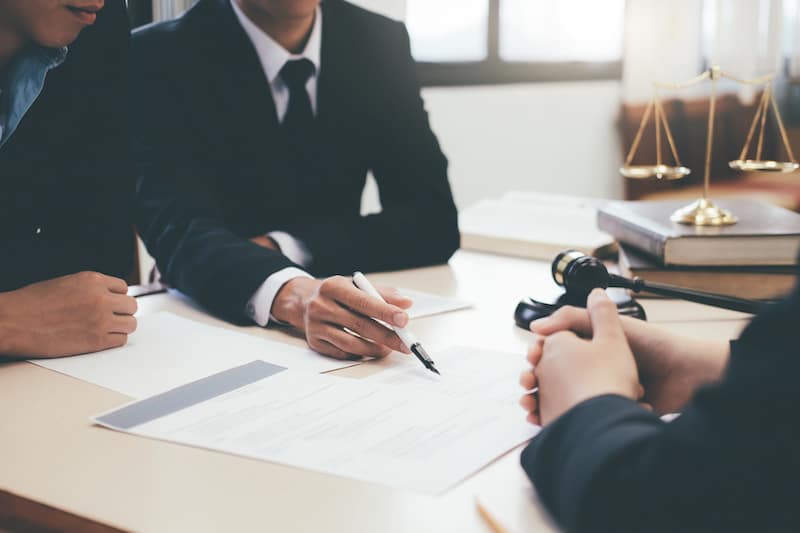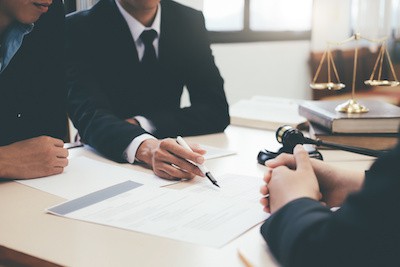
14 Sep Can a Plaintiff Be Deposed? What You Need to Know
Many of us have no prior experience with legal matters or terminology. Because of this, it can become quickly confusing when we find ourselves involved in a case! Whether you are the plaintiff or the defendant, there will likely be much to learn as you approach your deposition or courtroom trial.
Can a plaintiff be deposed? Yes, the plaintiff, or individual who initiates the lawsuit, may be deposed by the defendant’s attorney. A plaintiff’s deposition will be quite similar to the defendant’s deposition. Proper preparation is the key to a successful deposition as the plaintiff in a lawsuit.
As the plaintiff, you have likely experienced some sort of injustice, physical harm, or financial loss. Initiating a lawsuit against another party can be quite stressful and cause a good amount of uncertainty. In this post, we will provide you with the information you need to know as you prepare for your upcoming plaintiff deposition.
What You Need to Know About Plaintiff Depositions
While your lawyer should provide you with information unique to your case, educating yourself on the basics of plaintiff depositions can reduce the stress you may be experiencing. Although a deposition may seem quite intimidating, proper preparation will help eliminate some of the uncertainties you may encounter.
What Is a Deposition?
A deposition is a legal meeting that takes place during the investigative stage of a lawsuit. During a deposition, the lawyer representing the opposing party will ask you a series of questions to help them establish their case. While depositions do not take place in a courtroom, they are a serious event.
The deponent (individual answering the questions) will be under an oath during the deposition, requiring honesty throughout the meeting. Depositions often take place in the law office of the opposing counsel. However, they may also take place in a neutral setting such as a hotel conference meeting if requested.
It is important to note that the answers you are asked during the deposition can, and will, be used against you during the case. For this reason, it is important to think through each question and answer as clearly as possible. In some cases, a plaintiff’s deposition may be recorded by a legal videographer to be shown to the judge and jury during the trial.
Who Is the Plaintiff In a Legal Case?
The plaintiff in a legal case is the individual who initiates the lawsuit. As the plaintiff, you are seeking financial restitution or a legal remedy for an injustice you experienced at the hand of a company or individual.
What to Expect During a Plaintiff’s Deposition
 For someone that hasn’t participated in a deposition before, the thought of such an intense meeting can be overwhelming. On the day of the deposition, you will need to arrive at the deposition location promptly, prepared to thoroughly answer any question posed by the opposing party.
For someone that hasn’t participated in a deposition before, the thought of such an intense meeting can be overwhelming. On the day of the deposition, you will need to arrive at the deposition location promptly, prepared to thoroughly answer any question posed by the opposing party.
When you arrive, refrain from speaking with the other participants (except for your legal representation). This is not a time to socialize, even if you are friendly with the other participating parties.
Once the participants have arrived, the deposition will begin with the administration of the oath. After being sworn in, you will begin to answer the questions that are asked of you. Typically, a plaintiff’s deposition will begin with basic questions such as your name, address, or relationship with the opposing party.
With the initial information out of the way, the opposing attorney will begin to ask questions regarding the case. This is often the most nervewracking portion of a plaintiff’s deposition. Take your time to answer each question thoughtfully and completely. If you remember more detailed information before the deposition is complete, you must correct your previous statement.
If, at any time, you feel overwhelmed, stressed, or confused, your legal representation can request a brief break. During this time, you can ask your attorney for advice and gather your thoughts before completing the deposition.
As soon as the deposition is complete, you are free to leave. Your lawyer will let you know if there are additional steps you must take. However, in most cases, there are no additional requirements for the plaintiff unless the case proceeds to a courtroom trial.
Questions You May Encounter During a Plaintiff Deposition
With your plaintiff deposition quickly approaching, you are likely wondering what types of questions you will encounter. While the specific questions of your deposition will depend on the unique circumstances of the case, there are several types of questions that you can expect.
Introductory Questions
As we mentioned before, your deposition will begin with a series of introductory questions. These questions may include questions such as the following:
- Have you participated in a deposition of any kind?
- Are you prepared to answer the questions you will be asked in this deposition?
- Do you understand what it means to be under oath?
The questions asked during this portion of the deposition are meant to confirm the rules of the deposition and help you relax.
Background Information Questions
With the introductory questions out of the way, the opposing counsel will move on to questions involving your background information. These questions may include the following:
- What is your full name?
- Are you known by any nicknames or surnames?
- What is your age?
- What is your marital status?
- Do you have a college degree?
- Have you been under arrest at any time?
These questions are intended to uncover personal information that could be used against you in the case. While it is important to answer each question truthfully, you mustn’t volunteer any information. For example, when answering if you have been under arrest, answer with a simple “yes” or “no”. Explaining the situation surrounding your prior arrest voluntarily could incriminate you later on.
Plaintiff Deposition Preparation Questions
Once the opposing party has completed their questioning of your background information, they will likely ask you questions about how you prepared for the deposition. These questions may include things such as:
- Did you have help preparing for your plaintiff deposition?
- Have you shared anything regarding the deposition online?
- What type of preparation did you do before the deposition?
These questions are asked to ensure that you have not violated any terms of client-attorney privilege or other regulations surrounding the deposition.
Questions Specific to Your Case
The final section of questions, and likely the longest, are questions that pertain to your specific case. This is the section that it is most important to properly prepare to answer as your answers can impact the outcome of the case.
Your lawyer will be able to provide you with an idea of the types of questions that you will encounter during this final segment of the deposition. They should also educate you on important deposition guidelines. You can learn more about common deposition questions here.
Preparing For a Deposition as The Plaintiff
As a plaintiff, you may not think about preparing for your deposition. After all, you were the one to initiate the lawsuit. However, proper preparation is the best way to ensure a successful deposition.
In addition to reviewing the events leading up to the deposition, it is also important to review proper deposition behavior and dress code. In many cases, what you wear to a deposition can strongly influence your reputation.
Equipped with the information shared in this post, we hope that you will be able to enter your plaintiff’s deposition with confidence. While it is certainly an important part of the legal process, educating yourself on what to expect can help to demystify the event. As always, your lawyer is the best source of information regarding the specifics of your deposition.





